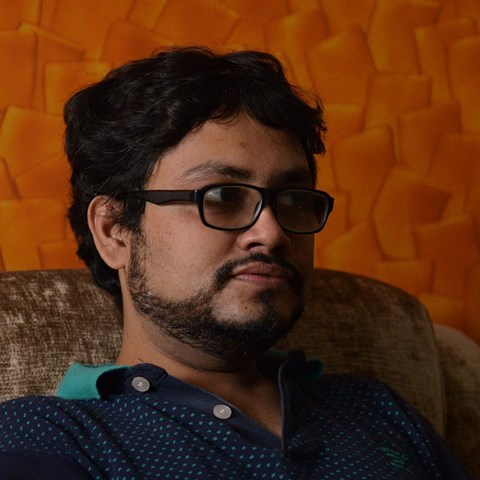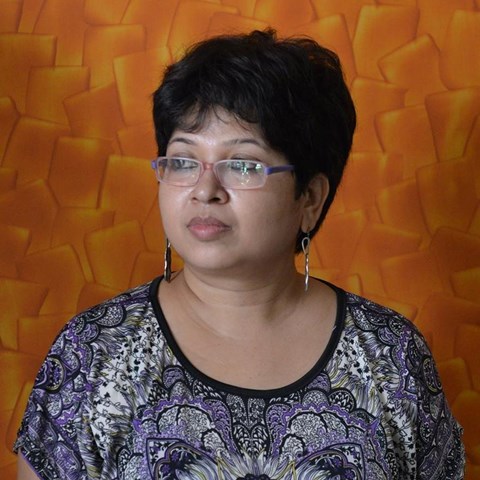LOVE TO CREATE TEXTURE OF SPACE THROUGH OUR NARRATIVES: RAJDEEP PAUL & SARMISTHA MAITI
Divya: What inspired you to become a Director?
Rajdeep Paul: I was born and brought up in the heart of the city of Kolkata. After completing my school education, I joined an Engineering College because my father wanted me to become a Computer Engineer. I also did a lucrative job at Infosys before quitting it permanently to pursue my dream of becoming a storyteller. I joined SRFTI in the Direction & Screenplay Writing department and there I met Sarmistha Maiti who was in the Film Editing department. We started collaborating from there and the journey continues where we write, direct, design and edit films together.
Sarmistha Maiti: I grew up in different corporate townships as my father was working in the Indian Oil Corporation and as usual, he too wanted me to choose a conventional career in the stream of engineering or medicine. I went on my own and did my graduation and post graduation in Comparative Literature and started my career as a journalist with the print media. For a long time, I have worked as an Art & Culture writer/journalist for different magazines, journals, dailies, etc. before I joined SRFTI in the Film Editing department. My connection with Rajdeep helped me to grow my creative spree, develop scripts together and then leading to the transformation of that script to the screen. In the core, both of us wanted to express similar thoughts and ideas with the same kind of politics related to human existence. And, thus, is our creative collaboration!
Divya: Having a degree in filmmaking is a Must for a filmmaker?
Rajdeep Paul: To learn the craft of filmmaking is important. Film schools happen to be one of the best places to learn this craft. One really gets to know and understand a huge spectrum of cinema and the art of making it step-by-step in a film school. I could think of giving up my engineering career and become a filmmaker because there existed something like the FTII and SRFTI. Film school degrees do help, but obviously it is not mandatory. What is mandatory is the propensity to learn.
Sarmistha Maiti: To become a good filmmaker, a professional degree might not be mandatory. But one has to learn and acquire the proficiency of the art and craft of filmmaking which is not just techniques and technicalities of the form of cinema. It’s a much bigger gamut that one can attain the first steps in the film school and then it is followed by years of experience in handling the craft. For me, yes, without going to a film school, I wouldn’t have landed up in making films.
Divya: Tell us about your all-time loved filmmakers and films.
Rajdeep Paul & Sarmistha Maiti: We would like to answer it together. The list of filmmakers whom we admire and are inspired by is inexhaustible. We are extremely fond of Guru Dutt films, films of Satyajit Ray, Ritwik Ghatak, Tapan Sinha, Shyam Benegal, Gulzar, Nagesh Kukkunoor to name a few. Akira Kurosawa, Victor Erice, Ang Lee, Sam Mendes, Martin Scorsese, Tarantino and it will go on and on…. Similarly, the list of our favourite films is also inexhaustible but to name a few: Komal Gandhar, Golpo Holeo Sotti, Goopy Gyne Bagha Byne, Pyasa, Kagaz Ke Phool, Sooraj Ka Sattwan Ghora, Teen Deewarein, Dor, Ijazaat, Satyakam, Golmaal, Schindler’s List, Citizen Kane, The Spirit of The Beehive, Farewell My Concubine, Pulp Fiction, Crouching Tiger Hidden Dragon, American Beauty, Psycho, The Lord of the Rings trilogy and many many more!
Divya: Your favourite genre of films?
Rajdeep Paul: I am fond of fantasy and sci-fi genre films, but that doesn’t mean I’m limited to these only. Our recent film ‘Kalkokkho’ cuts across different genres which include existential horror, gore, woman, family, mystery, disaster, spirituality, human rights and also magic realism. I want to make films about people which connect with people intellectually, emotionally and spiritually without pigeon-holing into any specific genre.
Sarmistha Maiti: I like social realism and human stories. But that should not be limited to certain kinds of stereotypes. My way of perceiving and looking at cinema is very open with an inclusive nature where several genres intertwine. My films are about people, their dreams, despair and courage to bring about a difference and I hope to continue with it.
Divya: A place where you would love to make a film?
Rajdeep Paul & Sarmistha Maiti: Both of us believe that location is absolutely content specific. If the narrative demands that the film should be shot on the top of the hills or under the sea, then it should be. Both of us love to create texture of space through our narratives and in this process, we have shot our films in very tough terrains. If opportunity comes, we would love to shoot a film on the moon… hahaha!
Divya: What languages do you like to/have made films?
Rajdeep Paul & Sarmistha Maiti: Actually, we have made films in different languages – Bengali, Hindi, English, Oriya, etc. Of course, Bengali being our mother tongue and we being practising filmmaking keeping our base in Bengal, it has been the most commonly used language in our films. Here also we would like to mention that we strongly feel, language too is very content specific and is dependent on the kind of social reality we want to explore and create. In Bengali too, we’ve made films in different dialects of the language that are very region specific to create the authenticity of the space and people we see.
Divya: Your role models in the Indian film industry?
Rajdeep Paul: There are many. I have been a great follower of the films of Guru Dutt, Satyajit Ray, Ritwik Ghatak, Tapan Sinha, Shyam Benegal, Nagesh Kukunoor, Hrishikesh Mukherjee, Steven Spielberg, Ang Lee, Sam Mendes to name a few. In fact, Nagesh Kukunoor was my inspiration behind leaving my engineering career and to follow my dream of story-telling as a filmmaker.
Sarmistha Maiti: I am very fond of the films of Guru Dutt, Satyajit Ray, Ritwik Ghatak, Tapan Sinha, Shyam Benegal, Gulzar, Meera Nair, Hrishikesh Mukherjee to name a few.
Divya: Your thoughts on script and direction done by 2 different people.
Rajdeep Paul & Sarmistha Maiti: It would be a fascinating experience to work on someone else’s script. We really look forward to that and also want that if someone would like to direct film/s written by us.
Divya: Challenges that you faced/face as a filmmaker.
Rajdeep Paul & Sarmistha Maiti: Filmmaking is all about challenges. And that’s how it’s so enticing. We think every filmmaker will comment on one definite challenge and that’s ‘budget’, isn’t it!
Getting right platforms and visionary producers to make your films happen for new filmmakers who want to create ‘out of the box’ is extremely tough. At times it becomes an unending struggle. For us, getting the support of the legendary Aurora Film Corporation, which happens to be India’s oldest functioning producing and distributing company since 1906, it’s a matter of honour that our first feature film ‘Kalkokkho’ has been produced by it and the film has already made landmark recognitions in the global platform of international film festivals.
Divya: Advice to the upcoming filmmakers.
Rajdeep Paul & Sarmistha Maiti: Follow your dreams and try to be honest to your craft.
Divya: How does it feel to have your film as part of the 19th Chennai International Film Festival?
Rajdeep Paul & Sarmistha Maiti: For both of us Chennai is love! It’s one of the most endearing cities we have been travelling to. Our real experience outside the film school in the cinematic journey had in fact begun over here. We used to come for married prints to Prasad Labs and we happen to be the last but one batch to make our diploma film in 35mm. You can thus feel that being a part of the 19th International Film Festival is indeed very special because ‘Kalkokkho’ (House of Time) happens to be our debut Feature Film which was a part of the Indian Panorama in the 52nd IFFI 2021 and now being able to present it in front of the august audience of the city we so much love is going to be an overwhelming experience which we are really looking forward to.

